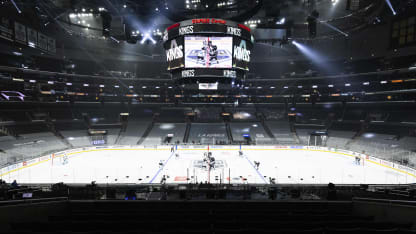NHL Deputy Commissioner Bill Daly told general managers Wednesday not to expect protocols to change through the end of the regular season and perhaps longer.
"We're going to continue to monitor how things evolve, how the vaccination landscape continues to evolve, how the science continues to evolve, and when and if we think it's appropriate, we'll revisit the protocols," Daly told NHL.com.
The GMs held their annual meeting Wednesday virtually instead of holding it over three days in Boca Raton, Florida, as usual due to the coronavirus pandemic.
The NHL Hockey Operations Department updated the GMs on items from cross-checking to coach's challenges. NHL Commissioner Gary Bettman went over what the schedule for next season could look like, starting the second week of October. Daly told the GMs he has stayed in touch with the International Olympic Committee but there is no agreement yet with the IOC for the NHL to participate in the 2022 Beijing Olympics.
At about the same time Commissioner Bettman told the GMs to remain vigilant in guarding against COVID-19, Lehner made unprompted, emotional comments at the end of a virtual media session.
Lehner said players were forced to take vaccines even though some were unsure; players were promised a new set of rules to get back to some type of normalcy if they took one; and now rules are not being changed so vaccinated teams won't get a competitive edge.
"They're talking about competitive edge instead of human lives," Lehner said.
Teams have been arranging for vaccines. In some markets, vaccines have been easily accessible. In others, including in the United States, they have been unavailable.
"The status of vaccinations is totally determined market by market based on the circumstances in each market and is totally directed by the clubs and the players," Daly said. "There is no League involvement whatsoever."
The NHL supports vaccination but cannot force players to be vaccinated.
"No, we don't have the ability to force players to take it, nor probably would we ask for the ability to force players to take it," Daly said.
Lehner said he had a couple of calls with the NHL and the NHL Players' Association on Tuesday, but it is unclear to whom he was referring.
"They told me yesterday that they're surveying all the teams to see who has taken the vaccine and who has not taken vaccines, and they're not going to change the rules for us as players until all the teams have a fair … have the vaccines at the same time, so it's not a competitive edge," Lehner said.
The NHL has been working with the NHL Players' Association and public health officials in Canada and the United States.
The League is monitoring vaccinations to stay abreast of the situation. But there is not enough science to change protocols based on vaccination, and the NHL doesn't think it will be close to herd immunity by the end of the regular season May 19.
"With respect to saying there was ever a promise made to the players by the League with respect to relaxed protocols, that is not true," Daly said.
Lehner, who has bipolar disorder, said mental health is not receiving enough attention as players live and work within the restrictions of the protocols.
After the media session, Lehner said on Twitter, "As I'm frustrated like a lot of people in the world right now everything didn't come out of today's press [conference] in the right way. Main point is that we need to start [to] take the mental health [as] important as well in this situation. It has a huge impact in society right now."
Daly said, "I am sympathetic to and understand his concerns and the sacrifices he's making to play. But that can't override what our judgment is as to keeping the players healthy and safe."

